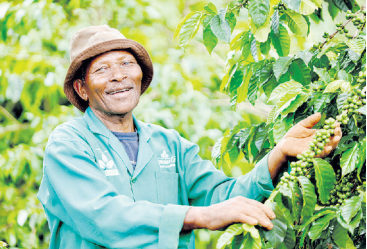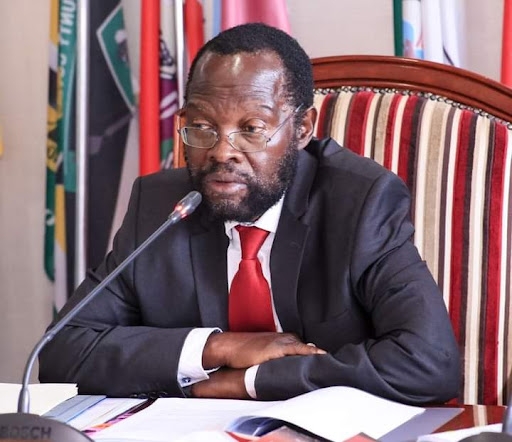
When Elijah Nyagah, 76, got an employment letter as a teacher in 1972, he immediately started planning his retirement.
Nyagah, a resident of Runyenjes, Embu county, says it is a good idea to start planning for retirement early.
“Farming has always been my passion,” Nyagah, who is the chairman for Kiviuvi Farmers Cooperative Society Limited, said.
Nyagah said it is not good to rely on salary alone. Farming generates more returns for him than teaching did.
Nyagah retired in 2002, having been promoted from a high school teacher to inspector of schools.
In 1984, he had 27,000kg of coffee, and the pay then was Sh3 per kilo.
“The amount of money I was paid then could do much better than now,” he said, adding that farming has wealth.
Nyagah started buying plots while working as a teacher to build his wealth.
Once he retired, he sold a number of plots he had acquired and invested in coffee farming.
He now has thriving coffee farms providing him with an income stream and also putting up some of his businesses, including a business premise that has so far utilised Sh15 million.
“Retirees should plan early to avoid depleting their pension once they retire by having other revenue streams,” he said.
Nyagah also owns one major business in a nearby town.
He said even though they have not been paid this year, farmers expect that the prices will hit more than Sh100.
Nyagah urged retirees to use their pension prudently.
He praised the ongoing reforms in the coffee sector, saying they are farmer-centred.
Today, he has grafted SL 28 and Ruiru 11 coffee blossoming in his farm.
Nyagah said the grafted crop is not only disease-resistant but also has roots that penetrate deep, meaning the crop accesses water and nutrients year-round.
Nyagah, who is also the Kenya Coffee Platform vice chairman, said he has been trying to find ways to improve income for his cooperative by looking for markets outside the country.
“We engaged a Chinese delegation a few months ago to see if they can buy our coffee. We, however, had a challenge as the coffee we produced was little in terms of volume,” Nyagah said.
Nyagah said one of the conditions given by the Chinese was that the taste of coffee should have been 83 per cent and above, a move they could not achieve.
He said even though the Chinese had promised them that the cost of coffee would go far above Sh200, meeting the conditions given was a tall order.
Nyagah urged the government to subsidise coffee inputs, such as fertiliser, to allow more farmers to reap maximum benefits.
Joseph Gichoya, another coffee farmer, also started planning his retirement 10 years ahead of time.
Gichoya worked as a teacher for 37 years.
He has since adopted farm tools, such as pruning shears, gumboots and a jembe, and embarked on coffee growing.
The former teacher says he is now enjoying the best moments of his life after his retirement coincided with intensive efforts by the Kenya Kwanza administration to revive the coffee sub-sector, which have now borne fruit.
The revival efforts started off with a two-day Coffee Stakeholder Summit held in Meru on June 8-10, 2023.
It aimed to return the crop back to profitability to improve the livelihoods of farmers in the 33 coffee-growing counties and, in turn, boost the country’s economy.
Coffee is one of the priority value chains that President William Ruto pledged to inject more resources into to spur economic growth from the grassroots in line with the Bottom Up Economic Transformation Agenda (Beta).
The government reopened Nairobi Coffee Exchange, and the implementation of a Direct Settlement System (DSS) to promote transparency and accountability and weed out the cartels.
The Coffee Cherry Advance Revolving Fund, which is now about Sh7 billion, was introduced by the government to provide low-cost financial support to small-scale farmers with coffee farms not exceeding 20 acres.
Speaking at his coffee farm at Baragwi in Gichugu, Kirinyaga county, Gachoya, who retired last year, said venturing into coffee has enabled him to have a dream retirement.
He said last year, coffee farmers received a record Sh145 per kilo of cherry.
“I am smiling all the way because this is the best price that I have ever seen in my life as a coffee farmer,” he said. “I got 18,000kg from my 3-4 acres of bush scattered around this place;. Coffee is gold, kahawa ni dollar.”
Gachoya praised the ongoing efforts to restore the lost glory of the crop.
Already, Gachoya is clearing his banana trees to create more space for coffee.
“If things go like this, we will be very rich. In fact, I will soon be able to drive those big cars you see on the roads,” he said, adding that young people should embrace agriculture.
“I also have 40 people during harvesting, so generally, I have helped the government create employment, and that is something that makes me proud.”
Kariuki Mwendia is another retired teacher and a successful coffee farmer.
He said the ongoing reforms in the sector will soon pay off.
Mwendia said he employs up to 80 labourers during the peak season from September to December.
Gachoya and Mwendia deliver the coffee cherry to Baragwi Coffee Cooperative, one of the oldest and biggest coffee societies in Kenya, which was established in the 1950s.
With about 20,000 members, Baragwi Farmers Cooperative Society today handles an average of 10kg of cherry annually.










